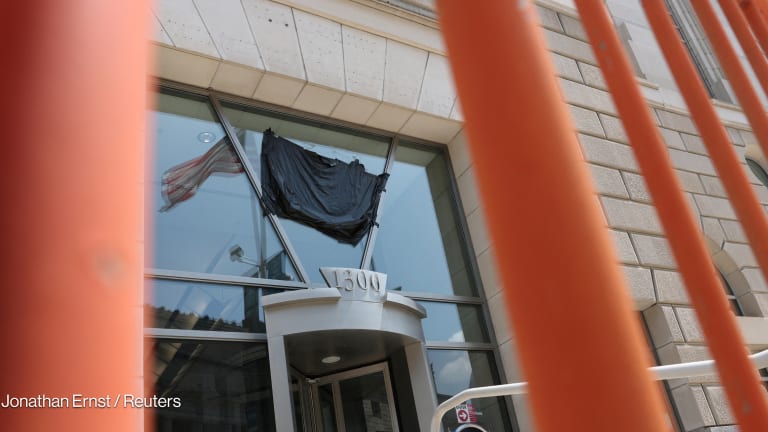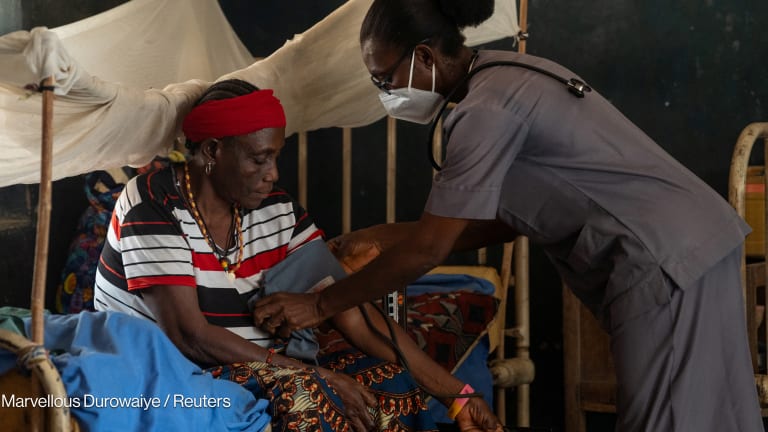Left in the dark: The human toll of USAID's global recall of employees
The Trump administration is planning to send USAID employees stationed abroad back to the U.S. within 30 days — but there's little clarity on how this will happen.
Emily, a career foreign service officer, and her partner are seven and a half months pregnant with a high-risk pregnancy. Over the past five days, they’ve been in the emergency room multiple times trying to manage the complications. And then their world fell out from beneath them. On Tuesday, the Trump administration ordered nearly all of the United States Agency for International Development’s direct hires globally to be put on administrative leave. For personnel abroad, the government is “preparing a plan” to return them to the U.S. within 30 days, as well as terminate the contracts of personal services contractors and institutional support contractors not deemed “essential.” Emily will be placed on administrative leave on Friday, Feb. 7, and her family will need to leave the country where she’s stationed. Amid struggling to bring their new baby into the world safely, her family now needs to rapidly leave behind the work she’s poured her soul into and uproot their other child from the “lovely existence” in the home they’ve built abroad. “The stress of this entire environment is making that pregnancy complication much worse,” she said. “God forbid this leads to the loss of a pregnancy.” Devex used pseudonyms throughout this piece to protect employees against retaliation for speaking to the media. Tuesday’s order has spread widespread chaos and confusion among thousands of USAID workers, with little clarity from the new administration on how this will all play out. USAID’s programming shut down on Jan. 24. Two weeks ago, the agency employed more than 10,000 people across the world. In fiscal year 2023, USAID spent $40 billion across more than 130 countries, a sum that totaled less than 1% of America’s federal budget. Its work has spanned the gamut, from responding to deadly disease outbreaks, disasters, and conflicts to providing lifesaving health care, economic support, and more. ‘Completely in the dark’ Emily’s family has to move even more quickly than others. An urgent medical evacuation is necessary because of the high-risk pregnancy. They’ve asked for a cash advance from the government because it will be expensive. But they were told that’s impossible because the USAID financial system is down and systems are in the midst of a transition from USAID to the U.S. State Department. “There are no systems to get us back rapidly,” she said. “The State [Department] side doesn't know how to do it. The USAID side doesn't know how to do it.” She’s anxious about how long her family will have health insurance. Emails to colleagues are bouncing back as undeliverable. Her own access to USAID’s systems will be cut off on Friday. “We're completely in the dark,” she said. “This onslaught is different. This trauma is being inflicted upon Americans intentionally, systematically, and with utter malice by the country we have dedicated our lives and our families' lives to.” --— Anonymous USAID foreign service officer And the pain inflicted goes beyond her personal circumstances. Emily works in a war zone, with local staff members depending on her. Her teams have had to shutter programs that provide lifesaving medicine and health care to refugees. They’ve had to stop educating children, some of whom rely on school feeding programs for the few reliable meals they might get each week. Programming also includes working with those who’ve fought oppression in their country and have chosen to align themselves with the U.S. and the pursuit of democracy, she said. “For some of them, they will die for that alignment. They were willing to take those risks,” she said. “I don't think that they could have expected where that got them today.” “We have completely abandoned them,” she said, fighting back tears. In limbo Sonya, a USAID personal services contractor in global health, has a half-filled suitcase sprawled out on her floor in a foreign country she calls home. She’s unclear whether or not she will have to evacuate. The Trump administration has provided some waivers that will allow limited work to continue, including for emergency food aid and lifesaving humanitarian assistance such as some medicines. Workers are also working to push through other waivers. But there’s little guidance on how exempted programs will actually move forward — including uncertainty around who will be left in countries to ensure they’re properly managed. Sonya is unclear as to whether her work will fall under a waiver. The notice sent by the Trump administration on Tuesday said the agency will let “essential personnel” know by Thursday at 3 p.m. Eastern Standard Time whether they can continue working and stay abroad. “I feel a little frozen right now,” she said. “We have zero guidance about how this is supposed to work.” One of her leading frustrations is the “draconian” decision to shut down the entire USAID financial system. To implement the waivers for programming that is allowed, the financial systems have to be working to make money available to partners. “You're paralyzing everything, which is chaotic and it's a crisis,” she said. “It's unclear who is making the decisions.” This move also makes it impossible for USAID employees to follow through on policies approved by Secretary of State Marco Rubio, she said. Sonya said the government owes her thousands of dollars for expenses such as travel and health insurance premiums — and she can’t be paid back when the systems are shut down. People have also been locked out of submitting time sheets. It’s also unclear if she does end up staying in her role abroad, whether that means she can’t leave the country. She had an annual leave planned to visit her elderly father, who recently had a fall. She also has medical appointments scheduled in the U.S. “It's not out of the question that if you left the country, they could say you can't come back in,” she said. “Nothing is predictable right now. … It's like there are no rules anymore.” No clear path back Katherine is a USAID personal services contractor based in an African country. Her family sacrificed a lot for this job. They spent their savings to move for the position, her husband left his job, the kids were pulled out of school and away from friends, and they gave up their house. Katherine’s daughter had a birthday last weekend, but it was difficult to celebrate. During the celebration, Katherine and her husband were whispering in the corner about what might unfold in the coming days and how they would tell their kids. And they don’t have a clear path back to the U.S. They’re scrambling to call friends and family to see who they can stay with, where their kids will go to school, and figuring out how they’ll pay their bills. And they’re left with the logistics of it all, such as selling their car and getting their dog out of the country. She said the government owes her some $8,000 in expenses that were submitted for reimbursement and approved, but it's unclear if she will be paid back. Even in the midst of the personal toll, team members were trying to figure out how to hand off projects so lifesaving work could continue. “It’s hitting everyone in waves. There are lots of tears in the workplace,” she said. “It’s breaking our hearts on a lot of levels.” A new kind of onslaught The rhetoric being slung around by the Trump administration is also raising questions about the fate of USAID. Billionaire Elon Musk called it a “criminal organization,” and Trump said it’s “been run by a bunch of radical lunatics, and we’re getting them out.” A USAID official told Devex that overseas staff members have reported that they’re nervous about how the comments might be interpreted by global audiences. “It is a shameful, vile, unprecedented way to treat public servants, whose literal safety is at stake following vicious, defamatory Musk statements in public,” the official said. Another USAID official expressed concern about their colleagues in the country where they are stationed. “Not only are they now left jobless, some have raised that they could easily be targeted because of the inflammatory and inaccurate statement by the White House on work with transgender individuals, as well as tweets blaming USAID for COVID-19,” this official said. USAID employees also wonder what the true rationale is behind all of this and how this upheaval leads to greater fiscal responsibility. It's an incredible waste of money to put a bunch of people on administrative leave and ship their belongings back to the U.S. — with no clarity on whether some will return abroad, Sonya said. “It feels like 1984 despotism. We've been told we can't use certain words anymore,” she said, referring to the dystopian novel by George Orwell. On his first day in office, Trump ordered an end to programming that included words such as diversity, equity, inclusion; and environmental justice. “I feel like I'm living in a different reality,” Sonya added. And evacuating staff members — on its own — isn’t the problem, Emily said. USAID employees are tough people who have endured coups d'état, riots, bombings, tsunamis, and other natural and human-made disasters. Children of USAID employees have suffered from diseases “American families only read about in books,” Emily said. “This onslaught is different. This trauma is being inflicted upon Americans intentionally, systematically, and with utter malice by the country we have dedicated our lives and our families' lives to,” she said. “All because we took an oath to serve at the pleasure of the president of the United States of America.” “And I would do it all again without hesitation,” she added. Adva Saldinger and Ayenat Mersie contributed reporting to this article.
Emily, a career foreign service officer, and her partner are seven and a half months pregnant with a high-risk pregnancy. Over the past five days, they’ve been in the emergency room multiple times trying to manage the complications.
And then their world fell out from beneath them. On Tuesday, the Trump administration ordered nearly all of the United States Agency for International Development’s direct hires globally to be put on administrative leave.
For personnel abroad, the government is “preparing a plan” to return them to the U.S. within 30 days, as well as terminate the contracts of personal services contractors and institutional support contractors not deemed “essential.”
This article is free to read - just register or sign in
Access news, newsletters, events and more.
Join usSign inPrinting articles to share with others is a breach of our terms and conditions and copyright policy. Please use the sharing options on the left side of the article. Devex Pro members may share up to 10 articles per month using the Pro share tool ( ).
Sara Jerving is a Senior Reporter at Devex, where she covers global health. Her work has appeared in The New York Times, the Los Angeles Times, The Wall Street Journal, VICE News, and Bloomberg News among others. Sara holds a master's degree from Columbia University Graduate School of Journalism where she was a Lorana Sullivan fellow. She was a finalist for One World Media's Digital Media Award in 2021; a finalist for the Livingston Award for Young Journalists in 2018; and she was part of a VICE News Tonight on HBO team that received an Emmy nomination in 2018. She received the Philip Greer Memorial Award from Columbia University Graduate School of Journalism in 2014.








